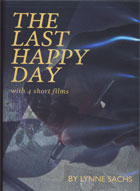
The Last Happy Day 2009
Distributed by Filmmakers Collaborative, Inc., 550 Bryant St., San Francisco, CA 94107; 415-546-0155
Produced by Lynne Sachs
Directed by Lynne Sachs
DVD, color, 38 min.
Jr. High - General Adult
Biography, Communication, Death and Dying, European Studies, History, Jewish Studies, Storytelling
Date Entered: 12/21/2011
Reviewed by Steve Bertolino, Reference and Instruction Librarian, Middlebury College, Middlebury, VTNot all documentary filmmakers are adept at making films about their own relatives, but The Last Happy Day shows that Lynne Sacks is not one of those. Alexander Lenard, a distant cousin of Sachs’ who was never even mentioned until late in her childhood, was a multi-lingual Hungarian Jew who fled from the Nazis to Rome, where he got a job reconstructing the dead bodies of American soldiers. Sachs uses your standard documentary techniques, like a voiceover in a Hungarian accent reading from personal letters, but then shows her ingenuity, and sense of what family means and how she wants to show that, by giving her two young daughters and their friends Lenard’s letters to poke through and explore and find interesting passages to read aloud. Her camera zooms into sharp focus on their pink, healthy hands and the brittle, faded letters with their loping script.
Other family members appear with stories of Alexander, and of other family members who did not escape the Nazis. Frequently through the film are snippets of four children (revealed soon enough to be Sachs’ daughters and their friends) acting out sections of Winnie-the-Pooh. After Rome, fearing another war after World War II and wanting to run away from it, Alexander went to Brazil, where he won money on a quiz show, enough to build a house in the woods for himself. He began writing a Latin translation of Winnie-the-Pooh which, when published in 1960, achieved the honor of being the only book in Latin to ever appear on the New York Times’ Bestseller List. Yet he never returned to Europe, or visited the branch of his family, which Sachs is descended from, who emigrated to America. Lenard’s letters reveal an obsession with war, with feeling that his life had been defined by it, and that was constantly on the hunt for safety and security that he never really believed he’d find. The title of the documentary comes from one letter where he wrote that he remembered, back in Budapest in 1912 when World War I had broken out, “there was great flag-waving and rejoicing. That was the last happy day that mankind was ever to know.”
Lynne Sachs presents a creative, insightful exploration into her distant cousin’s life and what war meant to him, and what he means to her family both past and present. It’s a short and accessible film, not graphic in any way apart from a few WWII photographs of dead bodies in a morgue, which would have appeal and meaning for any students junior high age and up. Awards
- Director’s Choice Award, Black Maria Film Festival 2010